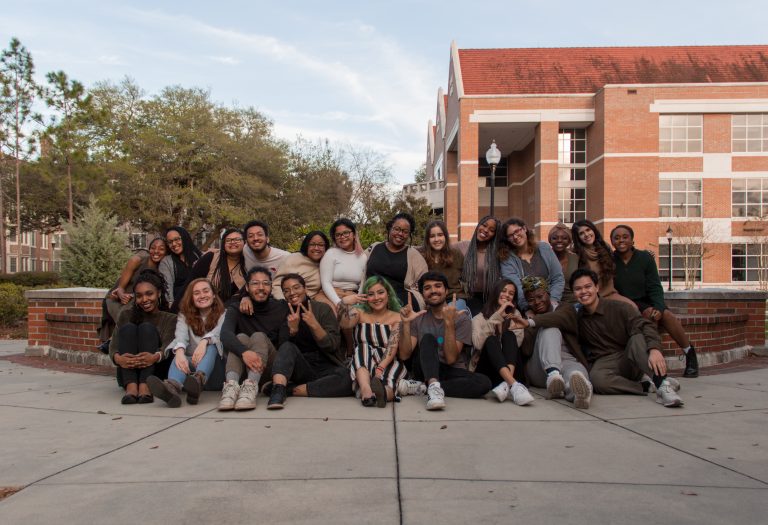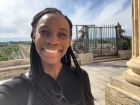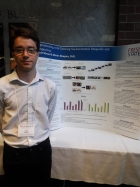Interview with Academics for Black Survival and Wellness
"Academics cannot stay silent about anti-Black racism, nor can they remain silent in the face of racial violence and injustice. We need to engage in the critical work to dismantle anti-Black racism within ourselves, others, and in the system."
-Jeannette Mejia, University of Florida Counseling Psychology Doctoral Student
Over the last few weeks, much attention has been directed towards the violence and injustice Black people are facing. In an effort to encourage academics to practice anti-racism and foster welcoming spaces for Black people in academia, graduate student, Pearis Bellamy and Dr. Della Mosley of Academics4BlackLives created the Academics for Black Survival and Wellness initiative. Beginning on Juneteenth, Academics4BlackLives invites non-Black academics to participate in development training on white supremacy and anti-racism. The initiative also offers resources for Black academics and encourages them to engage in rest and resistance. With this, Academics for Black Survival and Wellness is helping provide knowledge and resources so that non-Black academics can take concrete steps to lessen the burden Black academics face.
We spoke to the team behind the initiative to discuss Black wellness, anti-Black racism, and their lab’s current research on these topics. Read our conversation below.
 Members of A4BL who spoke with us, from left to right: Jeannette Mejia, Dr. Della V. Mosley, Garrett Ross, Carla Prieto, Pearis L. Bellamy.
Members of A4BL who spoke with us, from left to right: Jeannette Mejia, Dr. Della V. Mosley, Garrett Ross, Carla Prieto, Pearis L. Bellamy.
IM: To Black and other marginalized people, fighting against injustice in the academy is nothing new, but there seems to be a greater push for change this time around, why do you think that is?
Jeannette Mejia: I think we’ve reached a tipping point right now in this country. The recent murders of Ahmaud Arbery, Breonna Taylor, George Floyd, Oluwatoyin Salau, Rayshard Brooks, Riah Milton, Tony McDade, and countless others have occurred at a time where we are already in the middle of a global COVID-19 pandemic that is disproportionately impacting Black communities. We (Black people and Black allies) have always resisted anti-Black racism, and we continue to resist. Our resistance in this moment, in addition to mourning and caring for our loved ones during this double (COVID-19 and racial) pandemic that we are facing, is a reminder that we will continue to hold these systems and the people operating within them accountable. We will continue to fight for Black liberation until it is realized, and in this moment (i.e. COVID-19), people are paying attention to these systematic injustices and violence in ways that they might not have noticed before.
IM: What are the main issues getting in the way of Black wellness in the US in general?
Dr. Della V. Mosley: Anti-Black racism is impeding Black wellness in so many ways. If you think critically about nearly any major system in the US from health care to prison, you will find structural barriers to Black wellness and people who knowingly and unknowingly uphold and enforce those barriers. Charlene Carruthers defines anti-Black racism as a “system of beliefs and practices that attack, erode, and limit the humanity of Black people.” It is so ingrained in our nation’s fabric that every day is a battle to survive and be well as a Black person. News of back-to-back murders of Black folx compiled with the Black deaths due to coronavirus has been overwhelming for our community and many of us are mourning while simultaneously experiencing racial trauma.
IM: Is your lab currently working on research projects that address these issues?
Dr. Della V. Mosley: Like many scholars who have been committed to deep study and action related to preventing and resisting racial trauma, the Wellness, Equity, Love, Liberation and Sexuality (WELLS) Healing and Research Collective is engaged in a number of projects that have the ultimate aim of promoting Black wellness. We have launched and implemented multiple projects working towards actualizing Black liberation through multi-method approaches including projects that focus on the (1) involuntary hospitalization of people of color, (2) critical consciousness of anti-Black racism, and many more.
 The WELLS Healing and Research Collective.
The WELLS Healing and Research Collective.
IM: What role do academics play in the encouragement of Black wellness and the Black Lives Matter movement?
Jeannette Mejia: A university campus is a microcosm of the larger society, as such, academia is a system through which anti-Black racism is maintained. Academics work with students across campus through multiple mediums (i.e. teaching and mentoring), and we bear witness to the toll (e.g. racial trauma and subsequent effects on wellness; [1]) that anti-Black racism and this sociopolitical moment is taking on Black and non-Black people of color who are students, staff, faculty, and/or community members we work with. Given our position within the academy, which is complicated by our multiple intersecting identities (i.e. this experience of being in a privileged position is different for academics who may be queer and Black as opposed to straight and white), academics have a closer proximity to access resources (e.g. grants) and tools needed to address systematic anti-Black racism. Academics cannot stay silent about anti-Black racism, nor can they remain silent in the face of racial violence and injustice. We need to engage in the critical work to dismantle anti-Black racism within ourselves, others, and in the system.
Academics for Black Survival and Wellness has received lots of attention in the academic community, with many academics going to your Twitter page and the website to learn more.
IM: What is the objective of Academics for Black Survival and Wellness?
Garrett Ross: This Black feminist-informed, weeklong intensive aims to foster accountability and growth for non-Black people and facilitate restoration and community for Black people. While wellness may look different for each Black person (e.g., continuing to resist, taking self-care, being in community), Black people who attend will have access to events, resources, and a space to be in community with other Black folx. Non-Black people who attend will be invited to engage in anti-racist work. Although each day consists of different learning objectives (e.g., being able to describe the historical context of white supremacy and racism in the US), the overarching objectives that undergird Academics for Black Survival and Wellness include: (a) understanding how this country continues to survive because of anti-Black racism and white supremacy, (b) recognizing complicity in and proximity to white supremacy while being attuned to physiological responses to this information, and (c) committing to Black allyship in different personal and professional roles and relationships. The coalescence of objectives for both training experiences (restoration and Black allyship) aims to comprehensively equip all participants with what they may need to resist and dismantle anti-Blackness right now and for our future.
IM: What has the response to Academic for Black Survival and Wellness been?
Carla Prieto: We have a total of 4,775 folx signed up: 849 Black academics and 3,924 non-Black academics. Further, close to 2,000 people have signed our call to action. It is beautiful and poignant that almost 900 Black academics have committed to resting, healing, being in community, and continuing to resist for a full week. While our Black colleagues rest and re-charge, almost 4,000 non-Black academics have agreed to work through anti-racist learning and activities. This has been overwhelmingly encouraging and meaningful during these times. My hope is that our Black colleagues, peers, students, and mentees, will be able to thrive and be well in academia in part because of the long-term commitment of non-Black folx to act as active co-conspirators in the fight against systemic anti-Blackness in the ivory tower.
IM: What do you hope people will gain from the Academics for Black Survival and Wellness initiative?
Garrett Ross: We hope that this week gives participants the tools, agency, and capacity that they may need to be able to do something. Whether through the Black wellness week, wherein Black participants will recharge and meaningfully strategize ways of finding their “voice,” or through the anti-racism trainings for non-Black folx wherein non-Black participants will commit to Black liberation and allyship, we hope that people will leave this week feeling capable of dismantling anti-Blackness and white supremacy. With that being said, we also want to stress the importance of adopting a mindset that this praxis is an iterative and ongoing journey of both critical reflection and critical action. Moreover, we hope that participants begin to recognize and address how the current configuration of academia perpetuates white supremacy and ultimately inhibits Black people’s liberation.
So what can we do...?
IM: How do we ensure equal opportunities for Black and other underrepresented minorities in academia?
Pearis Bellamy: We should approach this question using an equity approach as opposed to equality. This approach would require the academy to allocate resources based on individual and collective needs of those who are most affected by systems of oppression. From this intersectional analysis, those with intersecting identities that have been marginalized by systems of oppression would also hold the greatest need to have access to wellness and resources. Holding an equitable approach would require the academy to (1) more scholarships, loan forgiveness, and financial resources allocated to Black students, (2) publicly acknowledge the historical wounds academia has inflicted on Black people across the diaspora, (3) hiring Black faculty and staff (who are representative of the diversity within Blackness; e.g., Black trans women) and others who are trained in anti-oppressive work, (4) creating a safe space for all Black students, faculty, and staff, and (5) increase salary for all Black personnel, staff, students, faculty. As this is only a starting point to addressing the injustices and trauma that Black people globally have experienced, beginning to redistribute resources based on the need that Black people experience is justified. Based on the position of Black people (i.e. group of people who experience most oppression), the needs to assure that Black and other marginalized groups in academia survive and are well are much higher. Systemic changes to the current structure of academia can help facilitate these visions of equity. Specifically, the current incentive structure within academia (mirroring society) does not value Black lives. If we are to facilitate the comprehensive engagement by faculty, staff, and students into upholding values of equity, justice, and centering the mattering of Black lives, a significant top-down administrative shift in the incentivization of Black liberation work is recommended.
Working to deconstruct systemic racism in academia is long overdue. The Academics for Black Survival and Wellness initiative is doing important work so that Black academics feel welcomed in academic spaces.
References
1. Carter, R. T. (2007). Racism and Psychological and Emotional Injury: Recognizing and Assessing Race-Based Traumatic Stress. The Counseling Psychologist, 35(1), 13–105. https://doi.org/10.1177/0011000006292033
Note: Original responses have been edited slightly for readibility and length requirements.


